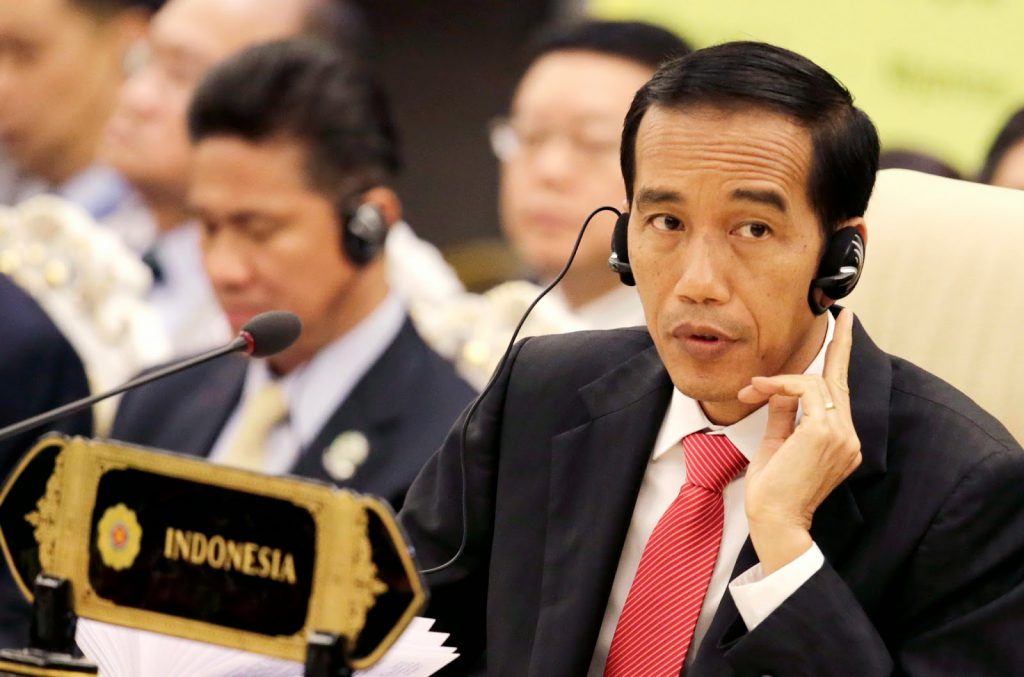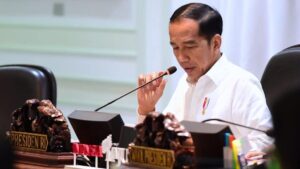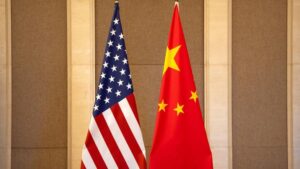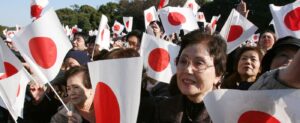What Does Having An Independent and Active Foreign Policy Means for Joko Widodo?

Illustration of Joko Widodo. Photo: EPA Photo/Azhar Rahim
This year marks the seventh year of Joko Widodo or Jokowi’s ruling in Indonesia. In the field of foreign policy, it is interesting to see what does having an independent and active foreign policy means for him. Being a pragmatic leader that always seeks to maximize the benefit from conducting international affairs seems to motivate him in enforcing the principle. Moreover, having to accommodate different opinions from his domestic political constituents also leaves him no choice other than retaining this ingrained foreign policy approach of Indonesia.
Indonesia’s Foreign Policy Approach under the “Pragmatic” Jokowi
Unlike his predecessor Susilo Bambang Yudhoyono, the formality of diplomacy and engagement in international forums are not Jokowi’s cup of tea. For him, foreign policy must be implemented as efficiently as possible to advance his vision for Indonesia: to grow in terms of economic and infrastructure development. This pragmatic view can be seen since the very first day when he came to power. In his inaugural speech, Jokowi stated that for him, ‘independent and active’ means ‘making friends with countries who could provide benefits for Indonesia’ (Bland, 2020). Although not being formally stated, he also prefers the kind of foreign policy which attracts domestic audiences and becomes the source of his political legitimacy. Given these conditions, it can be argued that ‘independent and active’ has been interpreted as a principle to allow the establishment of affair with any country who could favor Jokowi administration’s interest.
Backed with this pragmatic definition of ‘independent and active’, Indonesia then chose to remain neutral in the case of U.S.-China rivalry, not only to stress its independence but so that it could extract even bigger benefits. Jokowi’s key priorities on promoting economic growth and infrastructure development have topped his focus on whoever has the most funds and minimum requirements for investment. During his administration, China was always included in the top five countries with the largest foreign direct investment (FDI) realization in Indonesia, while the U.S. falls behind in the ninth position (Investment Coordinating Board of the Republic of Indonesia Indonesia, 2021). So although the U.S. needs Indonesia as a new ally to help it counter Chinese influence in the Asian region, Indonesia does not seem interested. When the status quo shows that the U.S. FDI realization is way lower than China, Indonesia is more interested in taking advantage of U.S. interests in the region by encouraging it to be more generous in terms of giving FDI to Indonesia. Exploring the possibility of increasing trade and investment between the two countries was among one of the points discussed in a call between Indonesian Minister of Foreign Affairs Retno Marsudi and U.S. Secretary of State Anthony J. Blinken last February (U.S. Department of State, 2021). From this illustration, we can say that the ‘independent and active’ approach had allowed Indonesia to ‘comfortably’ extract benefits from two great powers at the same time.
Indonesia’s vision to be a regional leader has also prevented itself to side with a particular country. Though not being developed as ambitiously, the existence of Global Maritime Fulcrum and Indo-Pacific vision requires Indonesia to actively cooperate with major and middle powers in the region. There is a need to have balanced relations with the U.S., China, Japan, Russia, and India, as well as deepened relations with Australia and South Korea if this vision is to be realized (Sukma, 2019).
Independent and Active Foreign Policy as a Way to Deal with Contestation between Jokowi’s Domestic Political Constituent
Just like what Mohammad Hatta did when he first initiated the independent and active principle, now Jokowi also utilizes the principle to serve his interest in stabilizing Indonesia’s domestic politics. However, if the principle was initiated to accommodate political ideology contention during Hatta’s office period, now this principle is being perpetuated to accommodate two challenges facing Jokowi’s leadership: the contestation between elites supporting Jokowi, and Indonesian people’s Chinese sentiment.
The aforementioned contestation between elites refers to the different view between Jokowi’s pragmatic versus nationalist supporters on how to implement the independent and active principle. Jokowi’s closest, pragmatic foreign policy adviser like Luhut Pandjaitan and Rizal Sukma has endorsed the perseverance of Indonesia’s conciliatory and cooperative manner with regional and global powers so that greater benefits can be expected. However, this approach does not satisfy the appetite of nasionalist promoters like the MoFA, Jokowi’s supporting political party Partai Demokrasi Indonesia Perjuangan (PDI-P), and his former opposition Partai Gerindra. They prefer the nationalist rhetoric to put a foreign policy that highlights Indonesia’s independence from other power’s influence (Connelly, 2014). Trying to find a middle-ground, it seems that Jokowi is using the term ‘independent and active’ to prevent people from questioning his nationalistic stance pending his “friendly” relations with other global and regional powers.
Beyond these bureaucratic politics matters, personal relations also seem to play quite a big role. Chinese conglomerates who have been supporting Jokowi will also disagree with the notion of taking sides—especially to the West. Given the amount of moral and material support that these people have provided, it is obvious for Jokowi not to take extreme steps against them (Wijaya, 2019). Meanwhile, allying with China as the region’s rising power is also not possible, given the sentiment among conservative Indonesians towards China (Temby, 2019).Therefore, independent and active is a principle with the power to mitigate the loss of support from Jokowi’s domestic political constituents.
Conclusion
In conclusion, the independent and active foreign policy is still being retained under Jokowi’s administration because for him, having such “flexible” principle means allowing Indonesia to maintain its proximity with any actors who can help it realize its national interests. By echoing that Indonesia adheres to this principle, Indonesia’s “neutrality” would instantly be justified even when it maintains very close relations with a country for its economic or strategic benefit.
References
Bland, Ben. (2021, August 24). Jokowi’s Foreign Policy Approach: Look for Friends with Benefits. Australian Financial Review. https://www.afr.com/world/asia/jokowi-s-foreign-policy-approach-look-for-friends-with-benefits-20200824-p55ou6
Connelly, Aaron L. (2014). Indonesian Foreign Policy under President Jokowi. Analysis. 1-22.
“Country-based Foreign Direct Investment Realization Rank in 2014-2021 [Peringkat Realisasi Investasi PMA Berdasarkan Negara Periode 2014-2021]”. (2021). Investment Coordinating Board of the Republic of Indonesia Indonesia. https://nswi.bkpm.go.id
Sukma, Rizal. (2019, May 28) “Strategic Imperatives for Indonesia’s Foreign Policy.” The Jakarta Post. https://www.thejakartapost.com/academia/2019/05/28/strategic-imperatives-for-indonesias-foreign-policy.html
Temby, Quinton. (2019). Disinformation, Violence, and Anti-Chinese Sentiment in Indonesia’s 2019 Elections. ISEAS Perspective No.67. 1-8.
U.S. Department of State. (2021, February 2021). Secretary Blinken’s Call with Indonesian Foreign Minister Marsudi.” Office of the Spokesperson U.S. Department of State. https://www.state.gov/secretary-blinkens-call-with-indonesian-foreign-minister-marsudi/#:~:text=Secretary%20of%20State%20Antony%20J,range%20of%20our%20bilateral%20ties.
Wijaya, Trissia. (2019). Chinese Business in Indonesia and Capital Conversion: Breaking the Chain of Patronage. Southeast Asian Studies Vol. 8 No.2. 295-329.
Inara Pangastuti is an undergraduate student of International Relations Universitas Indonesia. She can be found on Instagram with the username @inarapst





